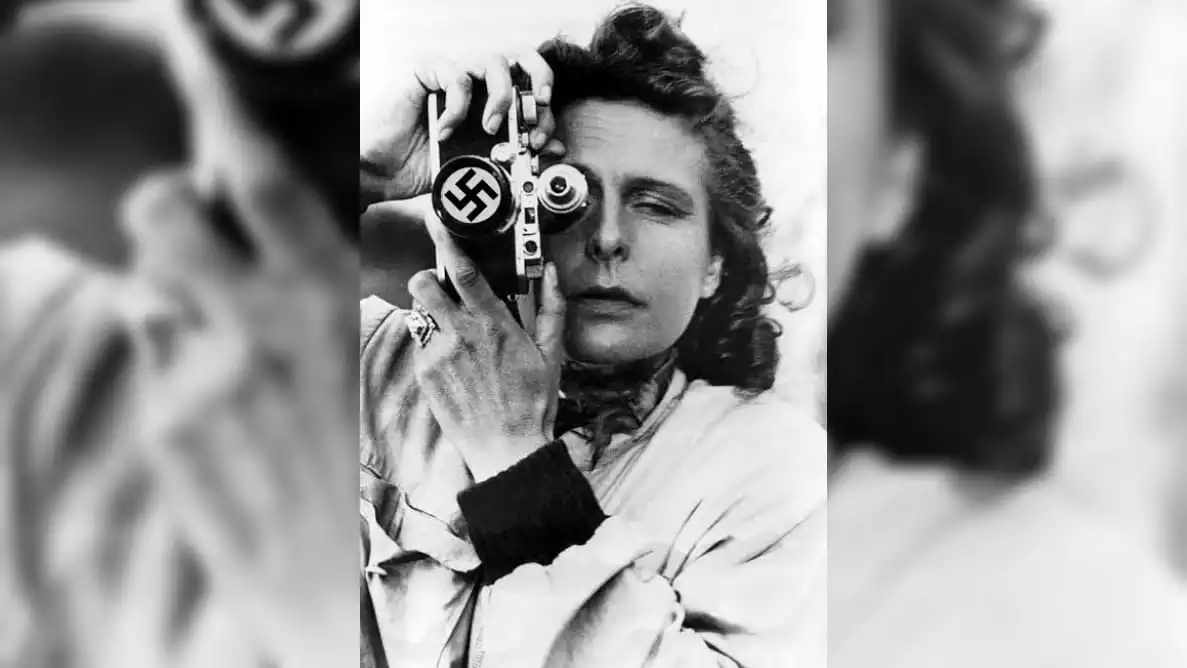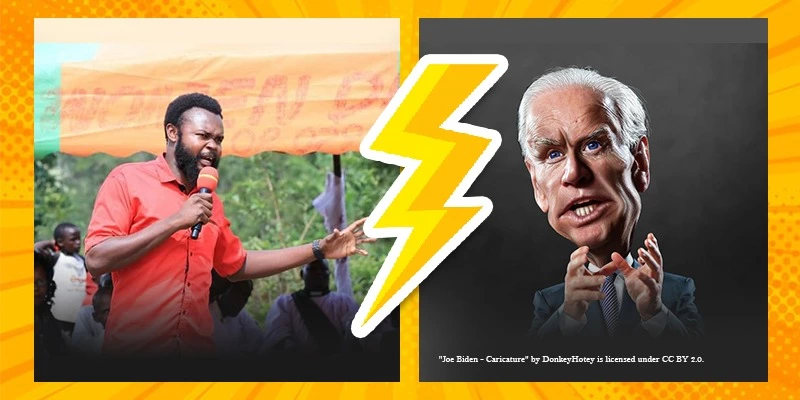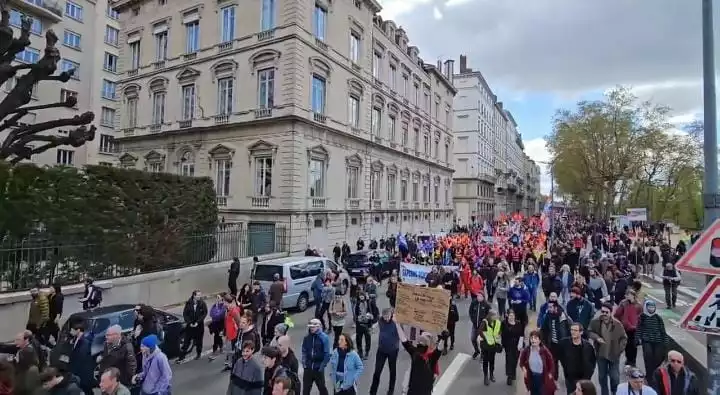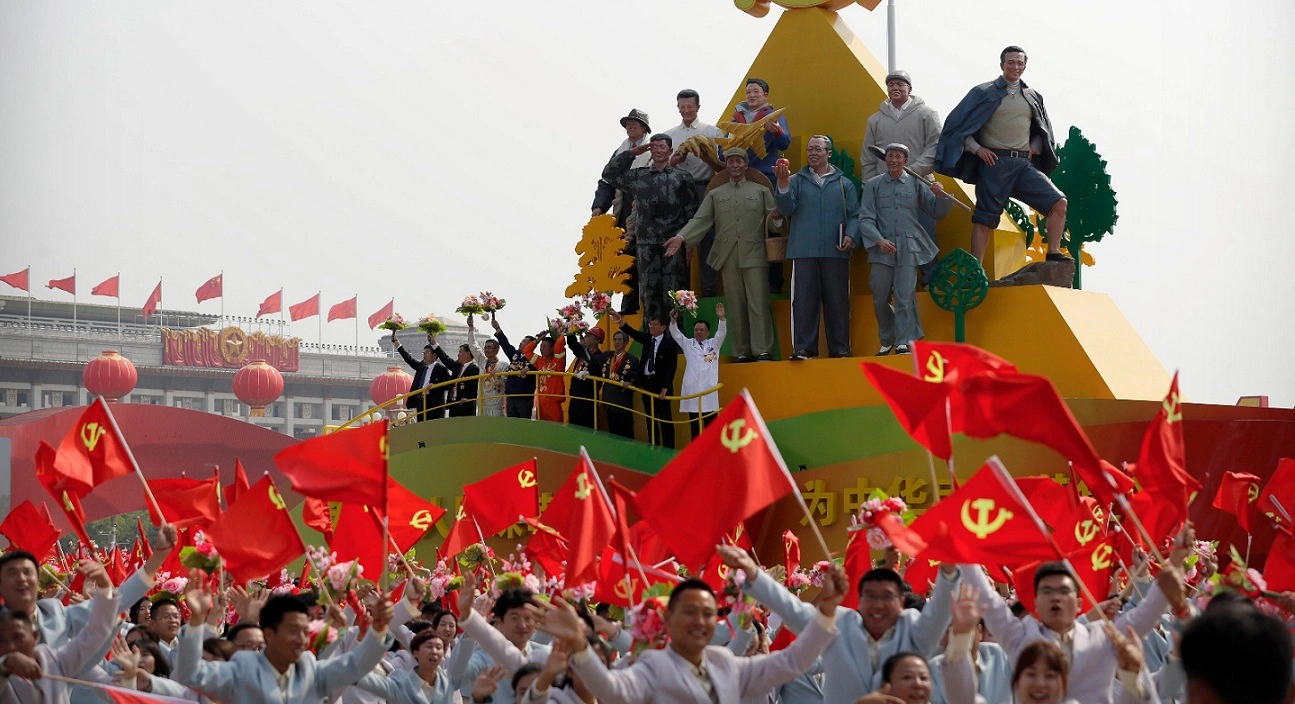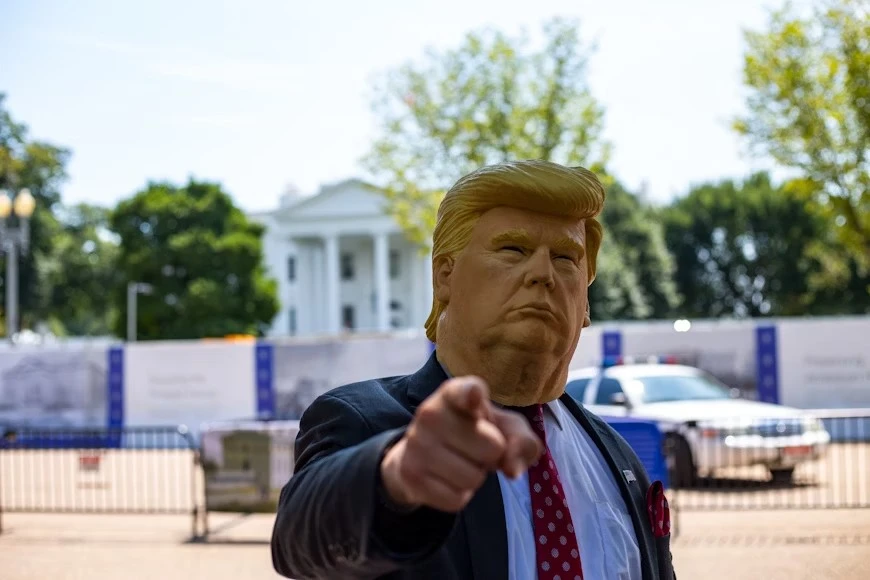The U.S. is agitating for a boycott of the 2022 Olympics in China. But in 1936, Hitler's Germany was able to hold glittering Games in Berlin - with U.S. help against international protests from Jewish and labor movements
Despite the worldwide calls for boycott against hosting the 1936 Olympics in Berlin, they finally took place, bigger and more brilliant than ever. Dictator Hitler stood with them at the summit of his international recognition.
The crimes of Hitler's government were internationally known since the beginning of 1933. They began immediately after the seizure of power in January 1933 with the arrest and murder of political opponents and their incarceration in concentration camps. This mainly affected communists, social democrats and other leftists. All parties except the NSDAP were banned. After May 1, 1933, the trade unions were broken up and expropriated.
The Nazis excluded Jews, Sinti and leftists from sports clubs. The two Jewish sports associations, Maccabi and Schild - they had about 350 member clubs in Germany in 1935 with a total of 40,000 members - were no longer allowed to use sports facilities. It was also clear that there should be no Jews on the German Olympic team.

1933-1936: International boycott actions
In 1931, two years before Hitler came to power, the International Olympic Committee (IOC) had awarded the 1936 Olympics to Germany - Winter and Summer Games.
In 1933, after Hitler came to power, only two governments drew consequences: the Soviet government and the Republican government elected in Spain in 1931. For 1936, they prepared the second People's Olympics in Barcelona with workers' sports federations from 17 countries; the first People's Olympics had taken place here in 1931. But when the 2,000 participants arrived in July 1936, General Francisco Franco's fascist coup began, supported by supplies from U.S. corporations such as Texaco, General Motors, Ford, Studebaker and Chrysler.
Sports federations from several European countries called for a boycott of the Berlin Olympics. The largest athletic association at the time, Amateur Athletic Union (AAU) in the U.S., under President Jeremiah Mahoney, also called for the boycott.
In May 1933, Rabbi Stephen Wise organized demonstrations in New York with the American Jewish Congress. The AAU organized a World Festival of Workers' Athletes there. It was supported by Jewish civic leaders, including New York Mayor Fiorello La Guardia, New York State Governor Herbert Lehman, and the Jewish
Labor Committee and the Anti-Nazi League. But the major Jewish organizations American Jewish Committee and B'nai B'rith held back on criticizing the Nazis. On August 15 and 16, 1936, only 400 participants turned out for the World Festival in New York.
In 1935, the second Jewish sports games, the Maccabiad, took place in Tel Aviv, with 1,350 participants from 27 countries. Most of the athletes, however, did not return to their home countries because of the advance of fascism in Europe - for example, in Spain, Hungary, Austria, and Poland.
In Norway, leftist organizations put on a Winter Spartakiade in 1936, with athletes from the Soviet Union, Sweden, and Finland. But the world press reported only from the simultaneous Winter Olympics in Garmisch-Partenkirchen, Germany.
In Austria, six of the eight Jewish athletes, including swimming champion Judith Deutsch, refused to participate in the Berlin Games: They were banned for life; Judith Deutsch emigrated to Tel Aviv as late as 1936.
But there were also Jewish collaborators. Several Jewish U.S. stars, such as weightlifter David Mayer and Samuel Balter of the winning basketball team, and sprinters Samuel Staller and Marty Glickman, wanted to be in Berlin. Harold Abrahams, a Jewish gold medalist in the 100 meters at the 1924 Games in Paris, lobbied for Berlin as chairman of the British Athletic Association along with Defense Minister Thomas Inskip.
The International Olympic Committee (IOC): Nobles, Generals, Entrepreneurs. The 1936 International Olympic Committee (IOC) included princes from the monarchies of Denmark, Japan, and Liechtenstein. Colonels, generals, field marshals, and grand admirals came from Germany, Italy, Poland, South Africa, Yugoslavia, and the Netherlands.
Both IOC members from the United States were entrepreneurs - Chicago construction tycoon Avery Brundage and real estate speculator William Garland. From France came Marquis de Polignac, head of the Pommery & Greno champagne cellars. From Germany came Karl Ritter von Halt, a member of the board of the Deutsche Bank, a member of the NSDAP and of the SS circle of friends Heinrich Himmler who was fond of donations. From Sweden came Sigfrid Edström, head of the electronics company ASEA.
The noblemen and their families, such as the British IOC members Clarence Napier Bruce, 3rd Baron Aberdare of Duffryn (=Lord Aberdare) and the 6th Marquess of Exeter (=Lord Burghley), were furthermore not only owners of large estates, but were also involved in companies. This was also the case with Baron Henri de Baillet Latour, the president of the IOC; he belonged to one of the ten richest families in
Belgium, which held shares in the largest bank, Société Générale, and other companies.
Decision by the USA
The IOC and National Olympic Committees stifled the boycott movements. Quick commitments for the Games in Berlin came from the fascist Axis powers of Italy and Japan, as well as from the fascist-like ruled states of Finland, Poland, Hungary, South Africa, Portugal, Romania, and Austria.
The 1932 Los Angeles Olympics had set new standards because of the number of participants, the records, the size of the stadium and other modern sports facilities. The participation or non-participation of the successful sporting nation of the United States - "the world's greatest sporting powerhouse " - would determine the significance of the 1936 Games.
The president of the American Olympic Committee (AOC) was Avery Brundage. His company owed its rise to government contracts during World War 1. He was the largest developer and real estate investor in Chicago. He had skyscrapers, luxury apartments and hotels built, including a manufacturing plant for Ford.
President of the U.S. Olympic Committee: ardent anti-Semite. Brundage admired Hitler and showed himself to be an avowed anti-Semite: "No Jews are allowed in my club in Chicago either. " He saw the boycott movement as a "Jewish-Communist conspiracy. " IOC President Baillet-Latour also supported Brundage's anti-Semitism: "Jews usually start shouting before they have a real reason to do so," he wrote to Brundage.

At the initiative of IOC President Baillet-Latour, Brundage was elected to the IOC. His U.S. colleague on the IOC, Charles Sherill, a brigadier general in World War 1, a lawyer in New York, and U.S. ambassador to Argentina and Turkey, was enthusiastic about fascism. In the New York Times on March 4, 1933, Sherrill, like other U.S. industrialists, praised Hitler as the best German politician. Likewise, Sherill had previously hailed Mussolini as the new statesman who could restore order in Europe with his system in place of the incompetent democracy.
Hitler Bribes the Honorary President of the IOC
To keep the founder of the Olympic Games and honorary president of the IOC, Pierre de Coubertin in line, Hitler granted him an "honorary gift" of 10,000 Reichsmarks (today about $100,000) shortly before the opening of the Games. Hitler had already offered him a life pension in 1935 if he supported the hosting of the Games in Berlin.
Swedish IOC members also played an important role in favor of Berlin. Clarence von Rosen, royal equerry married to a wealthy U.S. industrialist's daughter, was in-law to Herman Goering's wife Carin. Brother Eric von Rosen founded the Swedish fascist movement, and Clarence joined in. The second Swedish IOC member was Sigfrid
Edström: the head of the Swedish electronics company ASEA did good business with the German Reich.
Two British IOC members, Lords Aberdare and Burghley also lobbied for Berlin. Sir Noel Curtis Bennet, who was in favor of boycott, found no support. Winston Churchill appeased: communism was worse than Hitler.
After the German Wehrmacht occupied the demilitarized Rhineland in March 1936, French sports officials called for a boycott of the Summer Games, including Marc Bellin de Coteau, president of the international field hockey federation HIF, and Jules Rimet, president of the international soccer federation FIFA. For France, however, IOC member and champagne king Marquis de Polignac tipped the scales. France's ambassador in Berlin, André Francois-Poncet, lobbyist for French heavy industry, had already enthusiastically welcomed the Winter Games in Garmisch-Partenkirchen.
Henry Nourse also had nothing against the Nazi regime. The IOC member from South Africa had distinguished himself as a lieutenant-colonel in the British colonial army under General Lord Kitchener during the Boer War (1899- 1902): In concentration camps, Burian families and locals were starved to death, scorched earth tactics applied, and killing was indiscriminate. Nourse became the owner of South African gold and coal mines, where he was able to exploit blac people with state help - even before the formal legalization of apartheid after World War II.
None of them were swayed by the crimes of the Nazi regime, nor by the Nuremberg Race Laws passed in 1935, nor by Nazi Germany's military support for Franco's coup in the weeks leading up to the Games.
Token Jews
The U.S. member of the IOC, Charles Sherill, recommended to Hitler in two personal meetings how a few token Jews on the German Olympic team might reassure the international public. The Nazis followed Sherill's recommendation: two "half-Jews" were added to the German team as token jews: In addition to ice hockey star Rudi Ball, it was fencer Helene Mayer: outwardly she resembled the ideal image of the blond Aryan woman and lived in the USA. At the award ceremony, she gave the Hitler salute in the stadium.
The newly built Olympic Stadium with 100,000 seats - modeled on the equally large stadium for the 1932 Games in Los Angeles - was the largest in Europe. It was surrounded by a huge parade ground, an Olympic village, spacious sports facilities for the various disciplines and with art exhibitions.

Glamorously staged games
The Winter Games in the Alpine resort of Garmisch-Partenkirchen took place undisturbed from February 6 to 16, 1936, while the Summer Games were held in Berlin from August 1 to 16, 1936.
Initially, the Nazi newspapers Der Stürmer and the Völkischer Beobachter had agitated against Negroes and Jews, who had no place at the Olympics. But at the Winter Games in the Bavarian town of Garmisch-Partenkirchen, just as in Berlin, all signs with "For Jews forbidden" were removed, the demonized "Negro music" jazz was briefly permitted, and swastika flags waved cosmopolitanly to the international audience.
For the Games 1936, the Nazis invented the torch relay from ancient Greek Olympia across Europe, which have become customary ever since. 3075 runners carried the torch through five countries to Berlin. The final runner was only found after three rounds of judging: Running style, physique and posture, hair and eye color had to be right.
The world-famous composer Richard Strauss composed the Olympic anthem. Hitler's sculptor Arno Breker made sculptures of naked Aryan athletes (Die Siegerin, Der Zehnkämpfer). The Protestant Church held the opening mass for the IOC in the Berlin Cathedral. The light domes of Hitler's favorite architect Albert Speer, developed for the NDSAP party rallies, also shone above the stadium.
Fanfares accompanied Hitler's arrival, fights and award ceremonies. For the first time, competitions were televised. Corporations like Coca Cola appeared as sponsors. The IOC commissioned Hitler's favorite director Leni Riefenstahl to make the official Olympic film, which was also made with the help of motorized cameras - including underwater cameras - that were new at the time.
Propaganda Minister Joseph Goebbels and Field Marshal Hermann Göring vied for the favor of the celebrities with lavish parties. Goebbels had an "Italian night" organized on his Aryanized property on Berlin's Pfaueninsel. Goering invited guests to his Prussian palace. At any one time, 1,000 guests were invited: Kings, European nobility, the diplomatic corps, the IOC, officials from the SS, NSDAP and the ministries, stars of stage and film, even medal winners. Fireworks, dances with costumes from the ancient and Victorian eras were offered, fighter-bomber ace Ernst Udet showed his stunt tricks.
Hitler had declared that the games "strengthen the bonds of peace between nations. " It was not only the German bourgeois media that were on Hitler's course. The Kölnische Zeitung, for example, wrote: "The greatest celebration that the new Germany is giving to all the peace-loving peoples of the world." The Anglo-Saxon press, which shaped "world opinion," also chimed in: "Greatest sports show in history" (New York Times), "marvelous change in the thinking of the German people" (Daily Express, London).
On the Road to War
Already at its meeting in the Hotel Adlon in Berlin at the beginning of the Games on August 1, 1936, the IOC decided: The Games for 1940 were awarded to Tokyo - regardless of Japan's imperialist expansion in Korea, China and Taiwan. In 1939, the IOC awarded the Winter Games to Germany again. Brundage and the IOC fulfilled all Hitler's wishes.
Because of the excellent, also economic relations with the USA, Hitler's Germany wanted to present itself in Washington by a considerably enlarged embassy: None other than the contractor Brundage was to get the contract for the new building in Washington.
In 1938, after the Games, the Roosevelt administration replaced its previous ambassador to Berlin, William Dodd, who had been critical of the Nazis, with Hugh Wilson, a Hitler admirer. The latter berated U.S. media as "Jewish-controlled" for being too critical of Germany's treatment of Jews. Wilson praised the Hitler government for working toward a "better future." Hitler had "brought his people out of moral and economic despair and led them to pride and prosperity. "
